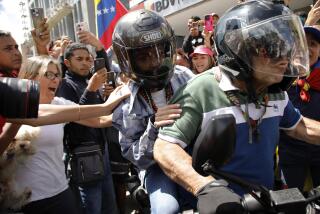Congressmen Join Managua Protest March
- Share via
MANAGUA, Nicaragua — About 300 anti-Sandinista activists marched through a Managua neighborhood Sunday to protest what they called the government’s failure to live up to the Central American peace agreement. Five Republican U.S. congressmen walked with them.
Opposition leaders faulted President Daniel Ortega’s refusal to meet two obligations of the accord--lifting the state of emergency and giving amnesty to prisoners--until other countries stop aiding the U.S.-backed Contras.
“The Sandinistas have no political will to live up to the agreement because they know that if they do, they cannot remain in power,” Julio Ramon Garcia Vilchez, a leader of Nicaragua’s main opposition coalition, said at a rally before the march.
Last Thursday was the deadline for each government to take initial steps required by the Aug. 7 agreement on ending guerrilla wars in Central America. The five-nation pact calls for cease-fires, amnesties, democratic freedoms and denial of outside aid and sanctuary to armed insurgents.
Ortega said Thursday that Nicaragua had “fully complied.” He announced his readiness to hold indirect talks with Contra leaders on a cease-fire and issued decrees to lift the 5 1/2-year-old state of emergency and to free all political prisoners arrested since Jan. 1, 1981.
But he said neither decree would take effect until U.S. aid stopped flowing to the rebels through Honduras and other Central American countries.
“The Sandinistas can make their own calculations and say they are complying 100%, but that’s just a word game,” said Miriam Arguello, a leader of Nicaragua’s Conservative Party leader. “They really have to comply. They cannot look around and point the finger at others.”
The rally and march were organized by the Democratic Coordinating Council, a coalition of business, labor and right-of-center political groups.
While many civil liberties remain formally suspended under the emergency law, the event was a sign of the relative freedom given to anti-Sandinista groups since the peace accord was signed.
Fear of Militants
Coalition leaders blamed the low turnout on fear of Sandinista militants called turbas who harassed dissidents in the early 1980s.
In his speech Thursday, Ortega said that all good Sandinistas are turbas and should not stand passively while “the sons of (President) Reagan” take to the streets.
Sunday’s opposition gathering met no resistance in Managua. But organizers said several truckloads of activists were unable to come from Masaya, 20 miles away, because Sandinista militants threatened their drivers.
The march also showed evidence of the growing activism by U.S. officials and diplomats on behalf of the opposition as it moves to test the peace pact.
Five visiting Republican congressmen, including California Reps. Robert K. Dornan of Garden Grove and David Dreier of La Verne, joined the two-mile march through Managua’s Eastern Market neighborhood from the coalition’s headquarters to a church.
Joining Dornan and Dreier were Reps. Jon Kyl (R-Ariz.), Herbert H. Bateman (R-Va.) and Jack Buechner (R-Mo.)
A plainclothes Sandinista agent along the route told Dornan, who was wearing a green and white Conservative Party sun visor, that he had “no business” there, the congressman said later. The agent did not interfere.
Dornan, a supporter of U.S. aid to the Contras, accepted an invitation to speak at the rally. Opposition leaders said the occasion was the first time a U.S. congressman had addressed an anti-Sandinista gathering in Nicaragua.
“There is not one U.S. congressman who would ever speak at a Sandinista rally,” he told the gathering in English. Roger Guevara, who is secretary of the coalition, translated his remark somewhat differently--”No U.S. congressman supports the Sandinistas”--and wild cheering erupted in the hall.
“But there are dozens of congressmen who would be willing to come to free rallies like this one and speak out for democracy,” Dornan added. He ended by shouting in Spanish: “Liberty--here, now!”
Interrupted by Shouts
Ramiro Gurdian, acting president of the coalition, told the gathering that President Ortega’s agreement to talk through a mediator to the Nicaraguan Resistance--the Contra leadership--was a “positive act that could lead to peace.”
He was interrupted by shouts of “Long live the Resistance!”
But Gurdian said there could be no settlement until the Sandinistas abandoned the military draft, socialist economic policies and party control of the army.
Although the government has allowed the opposition newspaper La Prensa to reopen, Gurdian said, it failed to meet the peace accord’s requirement of press freedom by keeping 22 independent radio news programs shut and not acting on a request for an opposition television station.
“On Sandinista TV we are mute,” he said. “You can see us, but we never talk.”
Opposition leaders also criticized the amnesty decree’s exclusion of prisoners arrested by the Sandinistas in the first 17 1/2 months after they took power in July, 1979. Among those not eligible for amnesty are 2,500 who were members of the National Guard under deposed President Anastasio Somoza.
The government argues that some guardsmen committed brutal crimes. But Lino Hernandez, president of an independent human rights commission, said that “most of the real criminals in the guard escaped or died.” Unless all prisoners are released, he said, Contra leaders will have little assurance that they can lay down their arms, accept amnesty and come home.
Ortega announced Thursday that 1,000 prisoners would be paroled this week. Officials later put the figure at 981.
More to Read
Sign up for Essential California
The most important California stories and recommendations in your inbox every morning.
You may occasionally receive promotional content from the Los Angeles Times.













